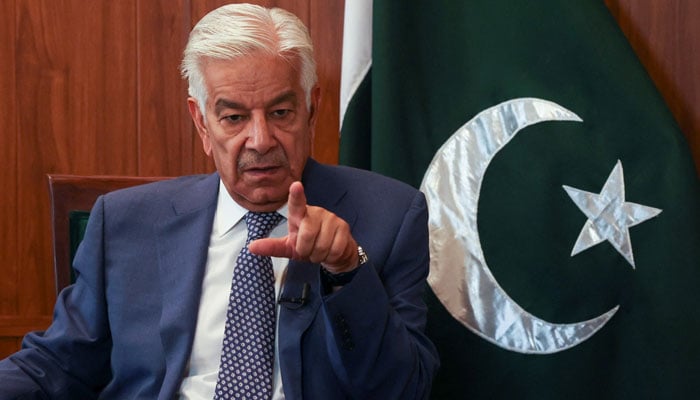ISLAMABAD: Defence Minister Khawaja Asif on Saturday strongly refuted the Indian Air Force (IAF) chief’s assertion of having downed Pakistani jets during Operation Sindoor, terming the remarks “implausible” and “ill-timed.”
His remarks came hours after IAF Air Chief Marshal AP Singh alleged that India shot down five Pakistani fighter jets and one other military aircraft during clashes in May — the first such statement by the country months after its worst military conflict in decades with its neighbour.
According to the Indian air chief, most of the Pakistani aircraft were downed by India’s Russian-made S-400 surface-to-air missile system. He cited electronic tracking data as confirmation of the strikes.
“We have at least five fighters confirmed killed, and one large aircraft,” he said, adding that the large aircraft, which could be a surveillance plane, was shot down at a distance of 300 km.
“This is actually the largest ever recorded surface-to-air kill,” he said, prompting applause from the crowd that included serving air force officers, veterans, and government and industry officials.
Islamabad, whose air force primarily operates Chinese-made jets and US F-16s, has previously denied that India downed any Pakistani aircraft during the May 7-10 fighting between the nuclear-armed neighbours.
Pakistan has said that it shot down six Indian aircraft during the clashes, including a French-made Rafale fighter. India has acknowledged some losses but denied losing six aircraft.
France’s air chief, General Jerome Bellanger, has previously said that he has seen evidence of the loss of three Indian fighters, including a Rafale. Indian Air Force has not commented on the claims.
Taking to X today, the defence minister said it was “ironic” that senior Indian military officers were being used as the “faces of monumental failure” caused by the “strategic shortsightedness” of Indian politicians.
He noted that for three months after the operation, no such claims had been made, while Pakistan had immediately presented detailed technical briefings to the international media.
According to him, independent observers had recorded widespread acknowledgement of the loss of multiple Indian aircraft, including Rafales, from sources ranging from world leaders and senior Indian politicians to foreign intelligence assessments. “Not a single Pakistani aircraft was hit or destroyed by India,” he stated.
Asif said Pakistan had destroyed six Indian jets, S-400 air defence batteries and unmanned aircraft, while swiftly putting several Indian airbases out of action. He added that the Indian armed forces had suffered disproportionately heavier losses along the Line of Control.
“If the truth is in question, let both sides open their aircraft inventories to independent verification — though we suspect this would lay bare the reality India seeks to obscure,” he said.
He cautioned that “wars are not won by falsehoods” but by “moral authority, national resolve and professional competence,” warning that such “comical narratives” for “domestic political expediency” risked grave strategic miscalculations in a nuclearised environment.
Asif reaffirmed that, as demonstrated during Operation Bunyanum Marsoos, “every violation of Pakistan’s sovereignty and territorial integrity will invite swift, surefire and proportionate response,” and responsibility for escalation would rest entirely with “strategically blind leaders who gamble with South Asia’s peace for fleeting political gains.”
— With additional input from Reuters.
